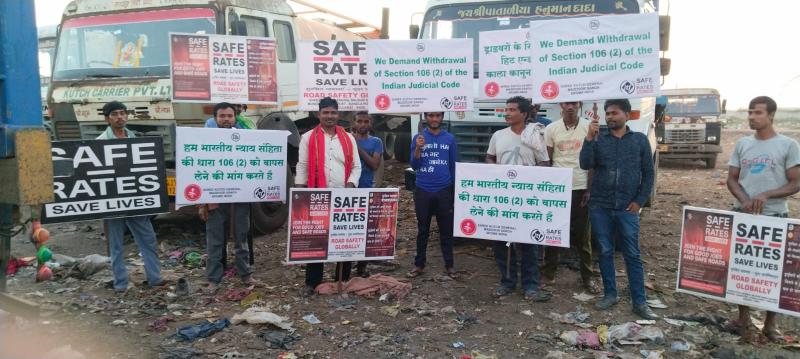A new report confirms that migrant workers are facing horrific racial, sexual abuse and human rights violations while working in the UK fishing industry. The ITF says that the UK government must close loopholes in its immigration rules that are allowing this to happen.
“This report confirms the incoherence between the UK’s immigration and maritime laws – and it is migrant fishers who are paying the price,” said Stephen Cotton, General Secretary of the International Transport Workers’ Federation (ITF). “The disarray has created a perfect storm of vulnerability for fishers who have been brought here ‘legally’ on seafarers’ transit visas only be exploited by vessel owners.”
Cotton welcomed the report by the University of Nottingham’s Rights Lab that adds a weight of evidence to expose the labour exploitation migrants fishers face at the hands of some UK fishing operators.
“The explosive report strengthens the ITF’s call on the UK Government to end the use of seafarers’ transit visas for migrant fishers, and switch to a system, like a skilled worker visa, that will give migrants fishers better protections against abuse,” said Cotton.
Between June and October 2021, the University of Nottingham Rights Lab conducted the first independent baseline study of working conditions for crew across the entire UK fishing fleet. It generated 108 surveys and interviewed 16 fishers from the UK, EU, the Philippines, Ghana, Indonesia, India and Sri Lanka.
Key findings
The Nottingham research revealed:
- 35% of fishers reported experiencing regular physical violence including racial abuse and sexual violence
- Migrant fishers average pay was £3.51 per hour working on UK fishing vessels almost three times lower than the National Minimum Wage
- 19% of participants reported working conditions comparable to forced labour
- 18% of migrant fishers were required to work on a vessel not named in their contract a clear violation of the terms of their transit visa
- Most migrant fishers reported being required to work excessive hours in violation of The Work in Fishing Convention – International Labour Organization (ILO) Convention C188 (which the UK ratified in 2019):
- 60% reported working a minimum of 16-hours a shift
- 1 in 3 reported working more than 20-hour shifts
- Over 60% of fishers (including UK nationals) said they would never report a grievance out of fear of blacklisting
- 100% of migrant fishers from outside the European Economic Area (EEA) were brought to the UK on seafarers’ transit visas
Transit visas completely unsuitable for migrant fishers – urgent reform needed
The Rights Lab report reveals that migrant fishers from outside the European Economic Area (EEA) are paid only a fraction of their European counterparts because employers are working the visa system - using the inappropriate seafarers’ transit visa to bring in crew.
The misuse of transit visas was exposed by the ITF earlier this week in its report A one way ticket to labour exploitation: how transit visa loopholes are being used to exploit migrant fishers on UK fishing vessels.
Chris Williams, ITF fisheries expert and author of the ITF transit visa report, reacted to the new Rights Lab research: “Seafarers’ transit visas are completely unsuitable to bring migrant workers to work in the UK fishing industry. It’s clear from these shocking findings that many fishing vessel owners play on fishers’ fears over their immigration status, in order to exploit foreign crew’s vulnerable position and have them work longer and harder than local crew, for less pay,” he said.
“Fishers fear that they will be deported from the UK or be blacklisted from the industry if they speak up or try to leave their vessels, even to go ashore for a brief stay or to report abuse. This is clearly unacceptable, yet these workers continue to slip through the government’s net due to lack of clarity between departments and a persistent failure to close the loophole that kicks off this chain of exploitation,” added Williams.
Stephen Cotton concluded: “Human trafficking and forced labour will continue to be a threat for Filipino, Indonesian, Indian and Ghanaian fishers recruited to work in the UK – we’ve been pointing out for many years.
“It’s high time the UK cleaned up its act,” said Cotton.
Quotes from fishers interviewed for the Nottingham Rights Lab report
- “I heard a vessel owner say. I can get 2-3 foreign crew for the price of one of you local lads.”
- “I took a loan … and had to pay the debt when I returned to Ghana. But because I return six months late, I had a lot more debt then. They say I had to pay 17,000 cedi. It was only gonna be 10,000 cedi. You see, 7,000 cedi because I not go home.”
- “Putting your head down and getting on with it is easier than saying no if you want to work in the UK again.”
- “Because of the visa, you have to stay on that vessel. If you leave that vessel for help then maybe you can’t work. You just wait with no money. Or if you ask for help they will just call the agency and say you broke your visa and you will have to pay for your travel home.”
END



